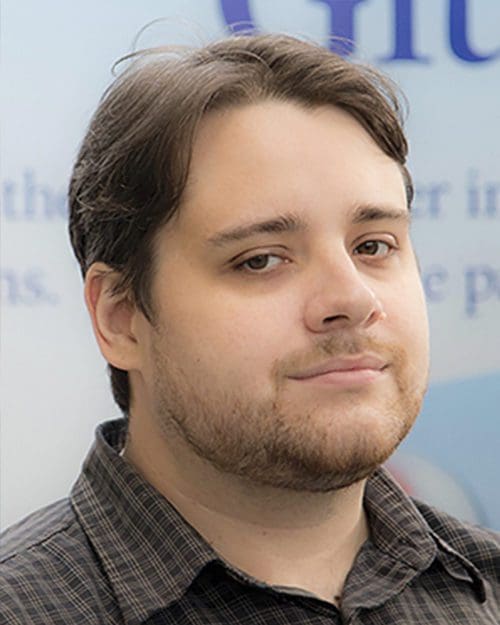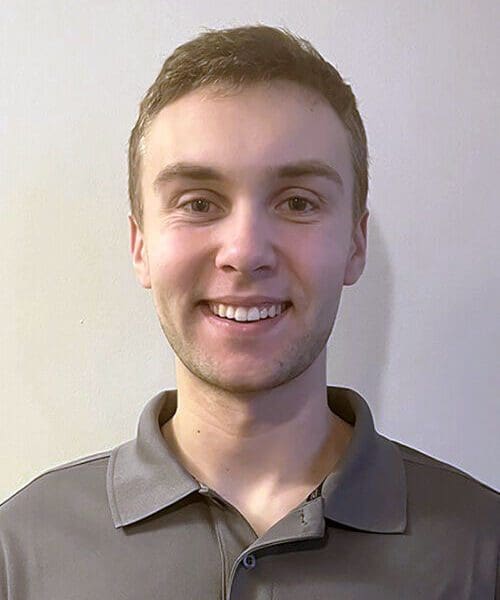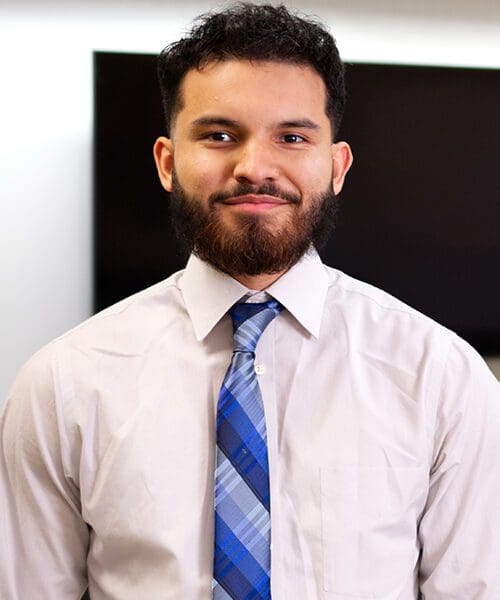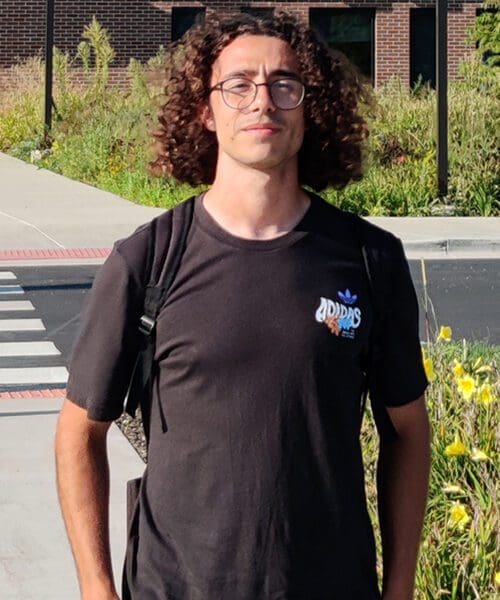
Dr. Andrew Jackura
The School of Engineering is #PNWEngineeringProud of Dr. Andrew Jackura. He is a 2011 BSME grad, 2013 BS in Physics grad, and a postdoctoral research scientist.
June 3, 2020
Hometown: Highland, IN
High School: Highland High School, Class of 2007
PNW degrees:
Bachelor of Science in Mechanical Engineering (May 2011); Bachelor of Science in Physics (May 2013)
Additional degrees:
Master of Science in Physics (Aug. 2017); Ph.D. in Physics (May 2019) from Indiana University (subject: theoretical nuclear physics)
Why did you choose your fields of study/majors?
I first chose mechanical engineering because of a recommendation from a high school teacher for my pre-calculus and technology education courses. I did not have a firm path that I started on, and my first year was a little shaky, but I was able to find my way and excel at my coursework. After my engineering degree, I decided to get my physics degree at PNW because as I learned more about the natural world during my engineering coursework, I realized that my true passion lies in understanding the fundamental ideas behind natural phenomenon.
Why did you choose to attend PNW?
I first chose to attend PNW, as it was an affordable option to get a world-class education in engineering. As the years went on, I also saw how lucky I was that I had this amazing opportunity to interact with faculty at a more intimate level than others at other universities. I still keep in contact with professors from the university, and maintain friendships I made during my tenure at PNW.
What was your most rewarding academic experience at PNW?
I have a few experiences at PNW that I feel benefited my outlook in academia. One such experience was my senior design project, which I completed with my friend and colleague Jacob Latham (BSME 2011), with Dr. Robert Kramer as our advisor. We were designing a solar thermal water heating system for the gymnasium at the Hammond Campus.
There were many learning experiences from taking the things learned in classes, and applying them to an actual project, with potential positive consequences for the university. We designed a system, and passed the qualifications for receiving our degree. We had an opportunity to present this to a board to try to secure funds to realize this design, but unfortunately as can happen with these types of projects, funding was not approved.
This was a valuable lesson that even though you can do everything correct and give the best job as you can, reasons beyond your control can prevent your goal. While we did not succeed in implementing our design, it did not deter me from pursuing bigger goals, as I have done throughout my academic career.
Specific classroom projects/learning experiences that have been beneficial:
I was involved with various activities/organizations during my time at PNW. Some examples are I used to be a supplemental instructor for physics, member of the local American Society of Heating, Refrigeration, and Air-Conditioning Engineers (ASHRAE), as well as a limited-term lecturer at one point for the physics lab courses.
One activity I am extremely proud of during my time at PNW was volunteering for the Engineering Summer Camp for local high school students. Headed by then Dr. Yeow Siow, I was one of two counselors (the other being Jacob Latham) who organized a two week program for high school level students who had interests in STEM. We worked with various members of faculty trying to come up with fun, yet educational, activities for the students.
One thing I will never forget is sitting with Jacob and Dr. Don Gray, building Lego robots for hours so the students could learn basic programming.
Current job:
I am currently a postdoctoral research scientist at Old Dominion University in Norfolk VA and Thomas Jefferson National Accelerator Facility in Newport News, VA. My research involves understanding how the rich structure of nuclei emerge from the fundamental degrees of freedom found in the Standard Model of Particle Physics, particularly the theory of quarks and gluons known as Quantum Chromodynamics (QCD).
It is focused on developing model independent analytic and numerical techniques, known as Lattice QCD, in order to describe few-body nuclear reactions. The faculty of the College of Science, both the engineering and physics departments, provided wonderful guidance and continual support for pursuing my passions.
Faculty and/or staff members who helped you along your journey at PNW:
There are many professors who have helped guide my interests throughout my years at PNW; I will name just a few who significantly impacted my academic career. First, both Dr. Adam Rengstorf and Dr. Daniel Suson of the Department of Chemistry and Physics played pivotal roles in facilitating my desire to pursue physics by encouraging me to continue my education despite what I felt was a setback at the time. They were always willing to humor my constant questions of the details of physics, and ultimately encouraged me to continue this quest.
Second, I firmly believe I would not be where I am today if it weren’t for Dr. Robert Kramer. I took Dr. Kramer’s second semester intro physics course, and he showed not only a firm command of the subject, but was always willing to spend time with us students after class hours discussing the topic of the lecture, and helping expand our understanding. At my request, he taught a special topics course which got me hooked into science.
I took approximately four more classes with him, ranging from advanced energy systems to nuclear physics, and served as my advisor during my final engineering year senior design project. His course on nuclear physics solidified my interests in the subatomic world, and I will forever be appreciative of him setting me on this path.
Awards/presentations at PNW:
- Distinguished Undergraduate Student Award
- Undergraduate Research Grant Program recipient, Fall 2011: Andrew Jackura and Gerald Keller; “Remote Operated Lens Cover for the NIRo Guider Telescope;” Prof. Adam Rengstorf, faculty mentor
- Jackura, A. & Keller, G. 2012, “Remote Operated Lens Cover for the NIRo Guider Telescope,” poster presentation at the 2012 Student Research Day
- Keller, G. & Jackura, A. 2012, “Design of Flat Field Lamp Using LED Array,” poster presentation at the 2012 Student Research Day [3rd Place Award for Undergraduate Poster Presentation]
Final thoughts about your PNW education:
I am very happy to have been a graduate of PNW. I have many experiences, formed lasting friendships, and took the combined advice from of my professors and mentors and used it as a guide for my career, and will continue to do so in the future.


